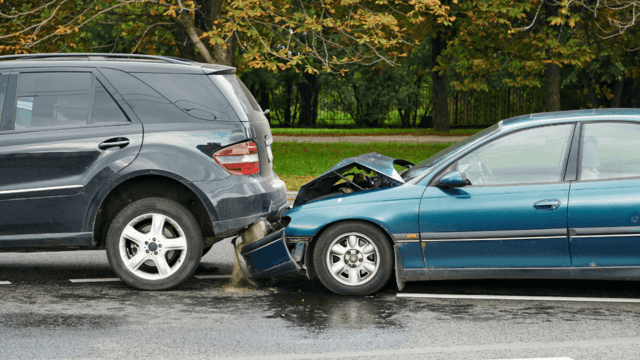The Most Common Injuries Resulting from Rear-End Car Crashes in Fort Worth

Rear-end car accidents, which happen when one car hits the back of another, are common on busy roads in Fort Worth.
In many situations, rear-end car accidents seem minor, nothing more than a fender bender. However, this is not always the case.
These incidents can cause serious injuries and fatalities.
Here, you can learn more about the common injuries caused by rear-end car accidents and how a Fort Worth car accident attorney can help.
Whiplash Injuries
Whiplash is a neck injury caused by forceful, rapid back-and-forth neck movement, like the cracking of a whip. It is a common injury in rear-end car accidents.
Many people in these crashes report neck pain and other symptoms, such as:
- Headaches, often starting at the base of the skull
- Dizziness
- Blurred vision
- Fatigue
- Difficulty concentrating
- Irritability
- Sleep disturbances
- Tenderness or pain in the shoulder, upper back, or arms
Doctors might use X-rays, MRIs, or CT scans to properly diagnose whiplash. Treatment often involves pain management, physical therapy, and sometimes, wearing a neck brace. It’s necessary for anyone in a rear-end car crash in Fort Worth to see a doctor if they feel neck pain or other whiplash signs.
Back and Spinal Cord Injuries
Back and spinal cord injuries are often seen in rear-end car accidents. These injuries can range from minor back strains to major spinal damage that affects a person’s ability to move or feel sensations. Victims might face long-term challenges and a need for ongoing treatment or rehabilitation.
Some common back and spinal cord injuries include:
- Lower back strains and sprains
- Herniated discs
- Fractures in the vertebrae
- Spinal cord damage leading to paralysis
These injuries can drastically alter someone’s life. They may lead to chronic pain, limit movement, or require surgeries and long-term physical therapy. A Fort Worth auto accident lawyer often sees how these injuries disrupt work, family life, and personal happiness.
Rehabilitation for spinal injuries may involve:
- Physical therapy to regain strength and mobility
- Occupational therapy for adapting to daily life skills
- Pain management techniques
- Psychological support to deal with emotional stress
Victims of rear-end car crashes in Fort Worth need to get a thorough medical evaluation if they suspect any back or spinal cord injury. Early diagnosis and treatment can improve the recovery outcome and help in legal cases handled by Fort Worth auto accident lawyers.
Head and Traumatic Brain Injuries (TBIs)
Head and traumatic brain injuries are serious concerns and can occur in rear-end car accidents. These injuries can range from mild concussions to severe brain damage. Such injuries demand immediate medical attention because they can impact a person’s health and daily life.
Common head injuries from rear-end collisions include:
- Concussions
- Skull fractures
- Contusions (bruising of brain tissue)
- Coup-Contrecoup injuries (injuries on both the site of impact and the opposite side of the brain)
Symptoms of TBIs may not always be immediate and can include:
- Confusion or disorientation
- Headache
- Nausea or vomiting
- Difficulty speaking or understanding speech
- Dizziness or loss of balance
- Sensitivity to light or sound
Recovery from a brain injury involves a comprehensive approach:
- Medical evaluation to assess the extent of the injury
- Rest and medication to manage symptoms
- Rehabilitation therapies, such as physical, occupational, and speech therapy
- Supportive care and monitoring for any long-term effects
Victims of rear-end car crashes presenting any signs of head or brain injury should seek prompt medical evaluation. Early intervention can significantly affect the recovery process.
Neck and Shoulder Injuries
Neck and shoulder injuries are common consequences of rear-end collisions, often resulting in pain and limited mobility for the affected individuals. These injuries range from mild sprains and strains to more severe ones like rotator cuff tears or cervical disc damage. The impact from such accidents can force the neck and shoulder into unnatural positions, causing damage to muscles, ligaments, tendons, and bones.
Treatment for neck and shoulder injuries may include:
- Rest and ice to reduce inflammation and pain
- Physical therapy to restore range of motion and strengthen muscles
- Medications for pain management
- In more severe cases, surgery may be necessary to repair damaged tissues
Physical therapy and rehabilitation play a critical role in the recovery from neck and shoulder injuries. A tailored physical therapy program helps to gradually rebuild strength and flexibility, ensuring a return to normal activities while minimizing the risk of further injury.
Victims of rear-end collisions must seek immediate medical attention following an accident to assess the extent of injuries and commence appropriate treatment. Early and effective treatment is key to a successful recovery and plays an important role in the legal process should victims seek compensation for their injuries with the help of a Fort Worth auto accident lawyer.
Navigating Recovery and Legal Steps After Rear-End Collisions
Rear-end collisions can lead to a range of injuries, from mild to severe, affecting various parts of the body. Victims may experience everything from whiplash and concussions to life-altering spinal cord and traumatic brain injuries.
The road to recovery involves immediate medical treatment, ongoing rehabilitation, and, in some cases, surgery. Physical therapy, in particular, plays a vital role in helping individuals regain strength, mobility, and function.
Beyond the physical and emotional toll, these accidents often have significant legal implications. Victims must seek medical attention and legal consultation promptly.
Fort Worth auto accident lawyers specialize in navigating these complex cases, ensuring that victims receive the necessary care and compensation for their injuries.






